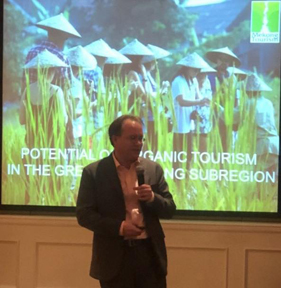Organic tourism for Thailand

Campaign aimed at hotels, restaurants, catering companies, supermarkets and other food outlets to wean farmers away from unhealthy and environmentally destructive pesticides, herbicides and fertilizers
A campaign to promote Organic Tourism across Thailand and the Greater Mekong Subregion has taken a major step forward with the convening of the first multi-sectoral workshop designed to brainstorm ideas and forge new partnerships to advance the cause.
The campaign is aimed at motivating hotels, restaurants, catering companies, supermarkets and other food outlets to wean farmers away from unhealthy and environmentally destructive pesticides, herbicides and fertilizers.
After taking root in Thailand, it is slated for expansion across Myanmar, Cambodia, Vietnam, Laos and Guangxi and Yunnan provinces of Southern China.
Over 40 participants including hoteliers, tour operators, academics, environmentalists, NGO and media representatives attended a workshop organised by Sampran Riverside and the Mekong Tourism Coordinating Office (MTCO), backed by the Tourism Authority of Thailand (TAT), Sustainable Food Lab Thailand, Asian Development Bank (ADB) and Destination Mekong.
Held at the The Athenee Hotel Bangkok, the workshop was also designed as a brainstorming session for the first Mekong Trends Symposium on Organic Tourism to be held in Bangkok alongside the 4th UNWTO World Forum on Gastronomy Tourism between 30 May-1 June 2018.
TAT Governor Mr. Yuthasak Supasorn said Organic Tourism fitted in perfectly with the TAT’s marketing campaign to promote Gastronomy Tourism. It is also in accordance with His Majesty the late King Bhumibhol’s "Sufficiency Economy" philosophy and the 17-point global agenda known as the UN Sustainable Development Goals.
Mr. Jens Thraenhart, Executive Director, MTCO, said, "We are excited to introduce the Organic Tourism concept to the Mekong Subregion with Thailand as the lead country. Strong tourist growth is coupled with a shift of consumers looking for clean and healthy food. Thus, the industry has to adopt and prepare for sustainable living practices. Aligned to the GMS Tourism Sector Strategy 2016-2025, Organic Tourism can be an important social movement in that regard, combining the two most important economic sectors in the region."
Over the next few months, a number of activities will be rolled out, including the 1st Organic Tourism Social Lab between 18-20 January 2018 followed by a second one in February 2018.
The campaign will also be publicised at various travel trade events such as the Mekong Tourism Forum in Nakhon Phanom, Thailand on June 27-29 and ITB Asia in October 2018.
The MTCO plans to publish a Mekong Trends Snapshot Report on Organic Tourism, with key insights from the meetings, as well as case studies. It is projected for release at the UNWTO World Forum on Gastronomy Tourism.
Valere Tjolle
@ValereTjolle
 United Kingdom
United Kingdom United States
United States Asia Pacific
Asia Pacific












































Dozens fall ill in P&O Cruises ship outbreak
Turkish Airlines flight in emergency landing after pilot dies
Boy falls to death on cruise ship
Unexpected wave rocks cruise ship
Storm Lilian travel chaos as bank holiday flights cancelled